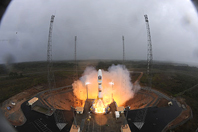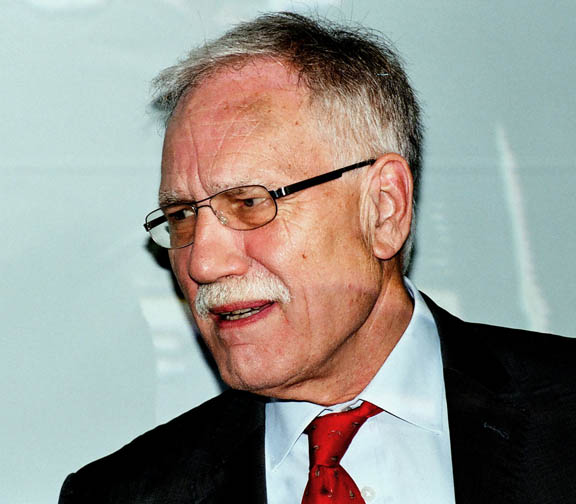Speakers at the 9th Annual Conference on European Space Policy wasted no time in addressing the somewhat worrying failure of several Galileo onboard clocks, as revealed by European Space Agency Director General Johan-Dietrich Woerner at a press briefing earlier in January in Paris. He made clear at the time that the clock failures, while indeed troubling, had had no effect on the operational integrity of the Galileo system.
Speakers at the 9th Annual Conference on European Space Policy wasted no time in addressing the somewhat worrying failure of several Galileo onboard clocks, as revealed by European Space Agency Director General Johan-Dietrich Woerner at a press briefing earlier in January in Paris. He made clear at the time that the clock failures, while indeed troubling, had had no effect on the operational integrity of the Galileo system.
Certain sources, however, seemed to want to jump on the clock story as another confirmation of a misguided and failed approach of the entire Galileo program, if not the entire European Union. Reactions from some quarters involved crying out, “There they go again, another gaffe for Galileo!”, and then watching as the relevant officials squirmed.
Yes, curious as it may seem, there are some people who enjoy watching officials squirm.
But there was no squirming at the conference in Brussels. Elzbieta Bienkowska, European Commissioner (EC) for single market, industry, entrepreneurship and SMEs, confirmed Woerner’s assessment of the operational status of all Galileo satellites, and not before reminding the assembly of the successes of 2016, including the first-ever four-at-a-time launch last autumn, and the successful declaration of Galileo initial services in December.
“A number of clocks have failed,” Bienkowska said. “Every large-scale project, in particular technology-intensive ones, face high risks. Galileo is no exception. Such things can happen, as we also learned from the experience of other navigation satellite systems. This is why we have four clocks onboard each satellite, to cope precisely with clock failures. To work properly, a satellite needs only one clock. All the satellites in orbit to deliver initial services are operational.
“We are monitoring the situation very closely,” she said. “As always, on technical issues, the Europe Space Agency is leading an in-depth technical investigation of the clock failures and is already implementing corrective actions together with the industry.”
So, the common message coming out of ESA and the EC is, in short, “smooth sailing.” The policy of installing more clocks than needed seems to have paid off. Despite the failed clocks, which number about six, all of the orbiting Galileo satellites still have at least two functioning clocks.
Bienkowska said she has recommended the setting up of a joint steering group chaired by the EC, along with industrial partners and ESA, to look into the clock failures and then make clear policy and industrial recommendations.
These clear policy recommendations are pertinent, because, as we know, Galileo is not just a technology program but a policy-driven program. It was Woerner who said during his press briefing in Paris that the decision to install the now-failing, but more importantly ‘made-in-Europe’ rubidium clocks onboard Galileo was a political decision, not a technical one, linked to the central EU policy goal of maintaining European autonomy in space.
Woerner also granted that while no orbiting satellite has been rendered inoperable due to a clock failure, impending launches could be delayed as the investigation plays itself out.
Later, Bienkowska proclaimed the important role of space, including Galileo, in European security and defense. She concluded by encouraging, among other things, “…faith in the added value of Europe…” and she called space, “…one of these – maybe the only one of these – concrete and positive examples of what we can do together in Europe.”
Godspeed, Antonio Tajani
The really bad news at the conference was the announcement that scheduled opening speaker and longtime Galileo advocate Antonio Tajani would not be appearing, due to responsibilities under his “new mandate.”
We remind readers that Tajani, the former vice-president of the European Commission, was recently voted into the Presidency of the European Parliament. Commentators expressed pleasure in knowing that our old friend is traveling in ever higher circles, and everyone in the European space community will now be expecting to feel his support from that new and even more influential position.
So, it was Tajani’s replacement speaker, European Member of Parliament Jerzy Buzek, who set the tone for the conference. He called in his opening address for a more concerted effort towards bringing space-based data and services to the people, for the benefit of society, but especially for the European economy.
Buzek mentioned increasing competition from a dynamic United States, and he spoke of the need to inspire the next generation of Europeans, a theme that has been repeated over and over for years.
The audience was then treated to a stimulating address by another highly placed personality, the High Representative of the Union for Foreign Affairs and Security Policy and Vice-President of the European Commission Frederica Mogherini, who said, about European space activities, “There is a clear link with our security and defense.”
Mogherini thanked Bienkowska, “…for the wonderful work we’ve done together with really a team spirit, that sometimes is new in our institutions…”
The EC’s new Global Strategy for Foreign and Security Policy, unveiled last summer, Mogherini said, is meant to encompass all the fields and all the tools of relevance to the EU’s external action, including space.
“We stress the need for cooperation,” she said, “and to develop some kind of common governance of space activities. We all understand that space is essential to our security and to our economy, so we have a strong and clear interest to promote the autonomy and security of our space-based services.”
This, by the way, is the same Frederica Mogherini who, just a few days later, would have very strong words for the incoming American administration in response to the announcement of new restrictions for people wanting to enter the United States.
“Human exploration of outer space began as a space race between the U.S. and the Soviet Union,” she said. “Today the Cold War is over, and I believe it is over forever. I not only believe it, but I hope it.”
Looking at the larger picture, she discussed preventing a new arms race and moving towards better global governance: “We often refer in the European Union to the fact that we invest in a rules-based global order. We don’t have so many actors that are investing in a truly rule-based global order, so we have a special responsibility as Europeans to play a role, to link up with the others that share our same agenda and to try and bring this agenda forward.”
She added, “We are engaging with our tools, our diplomacy, our political weight – because indeed we have some – and our capabilities. Europe’s strategy of autonomy includes Galileo.
“Strategic autonomy benefits not only our citizens and states, but also our partners, because the development of a full spectrum of security capabilities will make us a stronger partner for our friends around the world that are demanding more and more from the European Union to be a security provider around the world, including our American friends. So, we can set our partnerships globally on a more equal footing, sharing more equally the costs and the responsibilities of our common security.”
“Europe,” Mogherini concluded, “can and should be a space power, but it can only do so as a true union.”
This all developed against the backdrop of what some have called an existential crisis for the EU itself. And that existential crisis has a name…
Brexit
The breaks in between conference sessions featured much chatter about recent events. This being the new year and all, when people like to take a deep breath, look back and look forward. Brexit and the election of a new American president were on people’s tongues, with tones varying from amused to frustrated to nearly passionate. Everyone’s got a right to their opinion.
And the topic of Brexit also spilled onto the podium, with several speakers specifically alluding to “what’s happened,” not without the urging of at least one mischievous session moderator.
European Member of Parliament from Britain Clare Moody got the ball rolling, explaining to the conference why she thought Britain should have stayed in the EU: “We are united in diversity. It is by working together that we can achieve success in our endeavors in space. It is as a British MEP that I particularly recognize and cherish our ability to combine our efforts.”
Moody reminded participants of what she had said at the same conference a year ago. “I said then that space policy was one of the very many good reasons that the UK should have stayed – should stay – in the EU. My view on that hasn’t changed, although you may have noticed that the politics have gotten a little bit more tricky back in the UK.”
Moody continued on the theme of world politics: “Space is where we work with countries that we sometimes find more difficult to work with here on Earth.” She was also happy to note that ESA had endorsed the new EU Space Strategy and that the EC sees ESA as, “…a valuable, full and equal partner in developing space programs.”
This is an important point indeed for Great Britain, whose membership in ESA, if not in the EU, will ensure its continued presence in big-league European space projects such as Galileo.
During a question-and-answer session on space services integration, Jadwiga Emilewicz, Undersecretary of State for the Ministry of Economic Development of the still relatively young EU Member State Poland, was asked about the impact of Brexit on European space policy. “Thank you for the question which is not very directly connected with the topic of our discussion,” she responded, to the delight of some listeners, “although Brexit is interfering on almost every single discussion within the European Union.”
Brexit is important, Emilewicz said, but it will not interfere with the goals of Europe’s space policy. “I would say that if we want to achieve those ambitious goals, it could not be achieved without the active role of the United Kingdom.”
For his part, Woerner, during his press briefing in Paris a week earlier, had already addressed the question of Britain’s self-removal from the European Union. “ESA is an intergovernmental organization, so we are not part of the EU, so therefore there is no direct impact. The UK has clearly indicated that their membership in ESA is not in question. It’s more or less the opposite; they are increasing their contribution strongly.”
So, there is no immediate impact on Galileo, Woerner said. “We will see what happens in the future and how the UK and the EU really define the details, but for us the relationship with the United Kingdom is of very great importance, so we will do our very best to see that their Brexit does not have some negative influence on the space sector.”
The Wider and Oh-So-Bothersome World
While some speakers showed little fear of tackling head-on the touchy issues of the day, others preferred to work around them. Asked whether, in the wake of recent political events, the EU should not move towards breaking off completely from any sort of dependence on the United States, including in the space sector, Wales’ own Lowri Evans, Director-General of the Commission’s DG GROW, chose to dodge, slightly, expounding instead on the value and merits of European competitiveness, public funding and downstream operators.
“The return on investment that we get as public funders of space depends on how much we can actually galvanize the new start-ups or people that are not traditional space actors,” Evans said, “to really create new value added that is created in Europe, made in Europe.”
She did refer to competition with the United States in general, saying, “This is a services economy, a burgeoning services economy, and we are determined to do everything we can there. Because, to take up the American analogy, if we are not activists here, from a public regulatory and financial perspective, we will leave the space data world to people like Google. We’re not going to do that. We’re not going to leave it to the American multi-nationals.”
Woerner — at the earlier press briefing in Paris — had also addressed the change of American administrations, which, as usual, will involve a change in the NASA administration. “We are in contact with the transition team in order to ensure that ESA remains a strong partner of NASA in the future,” Woerner said.
There was nothing controversial here, even though one journalist wanted to know what would happen if the new American administration should decide to apply the same logic to its partnership with ESA as it has in its comments about unfair burden sharing within NATO.
Woerner provided a suitably respectful response, indicating essentially that ESA doesn’t work that way and its partnership with the United States is not under threat, so far.
Power to the People
The incoming American administration has been referred to on both sides of the Atlantic as “populist,” with all the varied connotations associated with that term. It was hard not to sense a tiny bit of “people power” creeping into the European Space Policy Conference, as exemplified by comments from various speakers.
If you recall, there was Buzek’s call for more “services for the people” and Evans’ emphasis on “Made in Europe.” Additionally, Pierre Delsaux, Deputy Director-General of the European Commission’s DG GROW, said, “We have several hundred people in this room, but we have millions and millions of real people outside, and we need those people to understand why space is important.”
Emilewicz believes everyday people in Poland need to know how important space is, but they also need to know that space is the EU and this is why they pay taxes. So, the people of Europe need to be considered and their support must be actively sought. Not that these aren’t the kinds of messages one always hears when European Space Policy is touted, but it did seem a little more palpable this time around.
MEP Cora van Nieuwenhuizen talked about the need for public awareness and support for space activities. “It’s not only necessary that all my colleagues in the European Parliament know that it’s really important, but you also need the support from your constituencies, so for that reason we need the general public to know a little bit more about what is happening.” She said people in the street in her constituency still don’t understand the full depth of penetration of space technologies in their daily lives.
Executive Vice-President, Head of CIS, Airbus Defence and Space Evert Dudok said, “If people don’t know why we invest in space, then what the heck… We have to do much more on applications that people can use.”
Bringing all the people together by bridging the digital divide was another people-centric priority highlighted by Jean-Loic Galle, President and CEO of Thales Alenia Space.
Back to Galileo
Participants were pulled back to the meat of the meeting by ESA Director of NAV Paul Verhoef, who hailed ever closer and ever more satisfactory cooperation between his Agency, the EC and the European GNSS Agency (GSA).
When discussing the launch of Galileo Initial Services, he sounded quite proud.
“It shows the world that we are progressing. Obviously, for many years there has been an undertone of ‘this system which is costing too much and it is too late’. So, I think that we have now put this behind us; the event in December was fantastic, also because it was mentioned around the world,” he said.
Verhoef said ESA’s United Space of Europe and Space 4.0 initiatives, and the EC’s new Space Strategy are all moving in the right direction, with the future focus on applications and integration of space services with terrestrial technologies. He cited the example of autonomous driving as one area where Europe can and should be moving forward very rapidly, working to integrate space-based navigation and Earth-observation services, a variety of ground-based technologies, the world of sensors, and all of the traditionally non-space user communities.
It is important, Verhoef said, for the space sector to put itself forward to provide better access to the space technologies that can make this integration happen. To this end, he stated, “We are trying to set up a common front office, if you will, between the application areas of navigation, communication and Earth observation, supported by our technical people at ESTEC (European Space Research and Technology Centre, Noordwijk, Netherlands), in order to offer a way into the ESA system for those who think that space can offer a contribution to their solution.
“So from our side,” he said, “we are trying to reposition ESA in this new world. We have a sector that is confident in its capabilities and open to the challenges that lie ahead.”
Finally, it was GSA Executive Director Carlo des Dorides who drew all the strands together, emphasizing the importance of public support, the rapid adoption of Galileo services and their integration into a multi-GNSS and multi-system environment, as well as the development and economic exploitation of useful applications.
For des Dorides, the current role of the GSA is to make the European Space Strategy concrete, in a future where Galileo and GNSS will be, “…one element of an overall multi-system, providing positioning and navigation, so the answer will not be GNSS only.”
The new emerging paradigm for navigation and positioning, he said, has ubiquity as a key element: “Navigation and positioning data must be available with seamless continuity wherever it is needed, so urban canyons, mountains, tunnels, in the parking area, in the garage.”
Positioning data must be robust and secure, he added, and there will be a new emphasis on “ambient intelligence.”
“This is the capacity to interact with the external world, and, more and more, between users,” des Dorides said.
That includes human users but also things, the internet of things, which, across the globe, already include more connected things than connected people.
In sum, the 9th Annual Conference on European Space Policy saw leaders and members of various space-linked communities taking stock, discussing challenges and sketching a future based on strong cooperation and united effort, with an eye toward, but not cowed by, the “interesting times” we live in.





